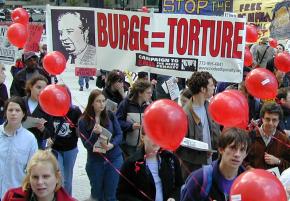Another obstacle to justice for torture victims
, a victim of Chicago police torture who spent 28 years wrongfully incarcerated, discusses a twist in the inquiry into torture cases.
NOTHING COULD be more horrible then spending decades of your life inside a prison even though you are innocent. But this has happened repeatedly in Chicago to a group of African American men who were torture victims of Chicago police under Commander Jon Burge.
The victims were brought in to Area 2 and Area 3 police headquarters as suspects. In order to get them to confess, they were handcuffed to rings attached to the wall inside interrogation rooms. Some had their pants pulled down and were assaulted with an unknown object. Others were connected to an electro-shock box. Many more were beaten with fist, flashlights and telephone books. They were suffocated with plastic bags and typewriter covers, their testicles were grabbed and squeezed, some were from windows, and police constantly used degrading racial epithets.
While some torture victims have been fortunate enough to win release and even gain compensation for being wrongfully imprisoned, others haven't. Last year, lawyers from the People's Law Office and Roderick MacArthur Justice Center filed a class-action petition for victims of police torture who remain behind prison walls in Illinois.

At a recent City Council meeting that approved $6.15 million settlements for two police torture victims, Ronald Kitchen and Marvin Reeves, alderman asked how it could be that there are still torture victims in prison. Mayor Rahm Emanuel, who had promised he would attempt to settle torture cases, issued an apology on behalf of the city to all those who suffered as a result of Burge's actions.
ILLINOIS LAWMAKERS, under heavy pressure from community groups, churches, attorneys and the families of torture victims, established the Torture Inquiry and Relief Commission, whose responsibility would be to determine if torture had occurred in various cases, and if it had contributed toward convictions. The commission hired David Thomas as its executive director, with the responsibility to investigate cases brought before it.
One guideline in the law required the commission to notify family members of the victims of crimes when someone came forward to claim torture in the cases where their relative was involved. In several high-profile cases where Thomas and the commission found credible evidence that a suspect had been tortured, and therefore referred the case to the courts for a possible new trial, he did not notify family members of the crime victim of the board's decision.
After family members of crime victims appeared at a recent meeting, Thomas resigned from his post, under pressure from Gov. Pat Quinn.
These relatives of crime victims have no evidence to contribute about whether or not someone was tortured. All they can do is provide the terrible details of how their loved ones were killed--they often believe a crime was committed by the person alleging torture, but they have no evidence one way or another about the torture claim.
The commission decided to rescind three recommendations for a judge to consider new trials in the cases of torture victims Jerry Mahaffey, Jackie Wilson, and Jaime Hauad. After listening to relatives of crime victims in all three cases, one must question whether it is fair for details about the crime to be permitted before the commission when its duty should be about seeking truth regarding claims of torture.
The commission has no standing to consider innocence or guilt in these questions, so one must ask why these relatives should be part of hearings. What is certain for now is that the relatives of crime victims have vowed to attend future meetings and to testify on different cases where what they say can only damn those seeking hearings on claims that they were tortured by police.
The family members of crime victims can't contribute evidence as to whether those claiming torture were in fact abused by the Chicago police, so the section of the law establishing the commission that requires notifying them should be repealed.


